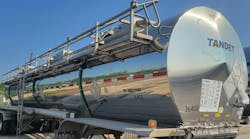Tank Fleets remain an economic bright spot for the trucking industry as a whole, according to Bob Costello, chief economist and vice-president of the American Trucking Associations (ATA). Only refrigerated fleets are running ahead of tank truck operations.
Tank truckloads increased approximately 7% in the first quarter of 2008, compared with the same quarter in 2007, Costello said in presentation May 20 during the National Tank Truck Carriers Inc annual conference in New York City. Refrigerated fleets outpaced tank fleets with an 11% increase in freight shipments.
Tank truck fleets should continue to outperform most of trucking for the rest of this year. “Positive factors include projections that tank truckload shipments of chemicals will grow faster than the overall economy even though chemical production growth will lag behind the economy,” Costello said. “Plastics production growth will be about the same as the overall economy due to the drop in automobile production. However, plastics production should increase at a faster rate over the next two years. Even with the higher prices, refined petroleum shipments have not dropped overall, and renewable fuels mandates are generating more tank truckloads. On the downside, cement production probably will lag behind the overall economy at least through 2009.”
Despite the generally optimistic outlook for tank truck carriers, 2008 could still be a tough year. Trucking overall was in recession in 2007, Costello pointed out. Truck tonnage was down 1.5% and loads dropped .7%. The trucking industry in general began a slow recovery in 2008, with the exception of fleets focused on the construction sector. Freight tonnage is up about 2.9% and loads are up 2.8%.
Looking down the road, Costello projected that US economy should rebound from the downturn before the end of 2009. He said he expects a W-shaped recovery that will start with somewhere around a 2.5% bounce in gross domestic product growth during the third quarter of 2008 as taxpayers begin spending their federal fiscal stimulus checks.
“This rebate program targeted people most likely to spend, and it will pull demand forward,” Costello said. “As a result, we'll see gross domestic product growth fall again in the last quarter of 2008 and first quarter of 2009. However, the economic recovery should be well underway by the second quarter of 2009. There's a good chance we'll avoid a recession.
“We need to remember during all of this economic turmoil that the United States still has the largest manufacturing economy in the world. We have simply shifted from labor-intensive to capital-intensive industries.”
Economic improvement doesn't mean an end to all of the current problems facing the trucking industry, though. Diesel prices will remain high and could reach $5 a gallon in coming months.
Diesel prices aren't likely to fall anytime soon, because diesel is the dominant fuel in much of the world. Chinese diesel imports are up eight fold over last year, and diesel inventories are down in Europe. A weak dollar is another reason for the soaring diesel prices in the United States.
Refinery utilization in the United States is relatively low right now, because profit margins for gasoline and diesel are too low. Crude oil costs account for about 60% of diesel's retail price, and that is hurting US refiners without their own crude oil reserves.
What this means is that US refining capacity will continue to fall, and the United States will become more dependent on refined petroleum imports from the Middle East and other regions. Fuel prices will remain high and very volatile.
More fleets, especially dry freight carriers, are likely to fail in the next year or so. Nearly 1,000 fleets with five trucks or more shut down during the first quarter of 2008. They operated a combined total of 40,000 trucks.
“Most of these shutdowns are occurring on the dry freight side,” Costello said. “We simply have too many fleets and too many trucks for the amount of freight being shipped at this time.”
Even with trucking companies exiting the industry, the driver shortage will remain. “The shortage hasn't gone away,” Costello said. “We'll begin to feel it again as the economy recovers.”
He predicted that truckload capacity will tighten quickly and significantly in the coming months. It will be driven by driver shortage, fleet shutdowns, and aggressive fleet downsizing.
All things considered, the trucking industry will remain a dominant player in the transportation sector. Tank truck carriers should continue to be star performers.








